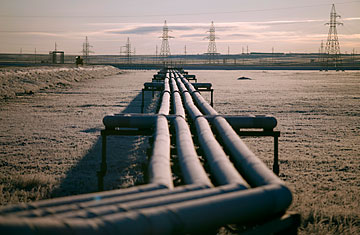
Pipelines stand in front of electricity pylons near OAO Gazprom's new Bovanenkovo deposit, a natural gas field near Bovanenkovskoye on the Yamal Peninsula in Russia, Oct. 23, 2012.
(2 of 2)
Still, a fair amount of those earnings are reinvested in the north, and the region's biggest city, Salekhard, is a gleaming monument to Russia's conquest of the Arctic. Nearly all of it has been built in the last 20 years, its buildings painted in bright colors to help treat the depression brought on by eight months of winter a year. Average wages in the region are around 70,000 rubles ($2,300) per month, more than four times the average in poorer parts of the country and not bad even by Moscow's standards. Putin's election results in this province, the Yamalo-Nenets Autonomous District, are therefore no surprise: He won with 85% of the vote, compared to 64% nationwide.
But Putin's gamble on the wealth of places like Yamal is still a risky one, because he has no way to hedge it. The global prices of oil and gas are outside of Russia's control, and if they fall — as they did during the 1990s — so do the pillars of the national economy. The day after the elections, the global rating agency Fitch warned of a possible downgrade if Putin does not abandon some of his campaign promises or find a reliable way to pay for them. Charles Seville, the Fitch director who issued the message, says projects like Yamal are not the solution. "It's not necessarily a bonanza for the government budget," he says by phone from London.
Just to break even in 2012, Moscow needs oil prices to stay at $117 per barrel, roughly the average this year for Russian Urals crude. But when Putin's campaign promises are factored in, the federal budget would need an oil price between $140 and $150 per barrel just to break even over the next six years, says Natalia Novikova, an economist for Citibank in Moscow. "If Putin wants to spend an extra 1.5 trillion rubles per year, he needs the oil price to go up by $30 per barrel," she says. Unless a war breaks out in the Gulf, the chances of that are slim, so it seems inevitable that Putin will have abandon at least some of his social payouts. "More likely, if the prices fall, then the promises won't be kept," says Nadezhda Ivanova, director the Sberbank research center that calculated their cost.
Russian officials, less than a month after the vote, have begun admitting as much. When TIME asked Arkady Dvorkovich, the Kremlin's chief economic adviser, how the President-elect plans to make good on his promises, he hinted that many of them were just vague enough to ignore. "[Putin laid out] no clear mechanisms, no clear rules and conditions for realizing some of these initiatives, so there is a certain amount of flexibility. We can spend more or we can spend less," Dvorkovich says.
But spending less than he promised raises Putin's political risks, particularly among the voters to whom he promised wage hikes and benefits. In the March election, for the first time, Putin failed to win half of the popular vote in Moscow, where tens of thousands of people have started protesting against his rule. Even in Yamal, that discontent is palpable.
Buslovsky, the young railway engineer, says seven out of the ten men on his team voted for a rival candidate, the nationalist Vladimir Zhirinovsky, while the other three didn't care enough to make a choice. "It's an objective fact that things have gotten better under Putin. Wages have gotten more stable. There is work. But I don't know. I'm just tired of him. How long can you look at the same face on TV?"
The conversation cuts off when Buslovsky's boss approaches. Adjusting the brown mink hat on his head, Krivenko signals for the crew to head back toward the all-terrain vehicles and climbs into the cockpit himself. Riding back, Krivenko explains the humble role his region plays in Putin's politics. "The machinery of the state has to work in harmony," he says. "We're all one team. We have the same mission." And with the bills stacking up, that mission, more than ever, is to suck the wealth out of the ground.
